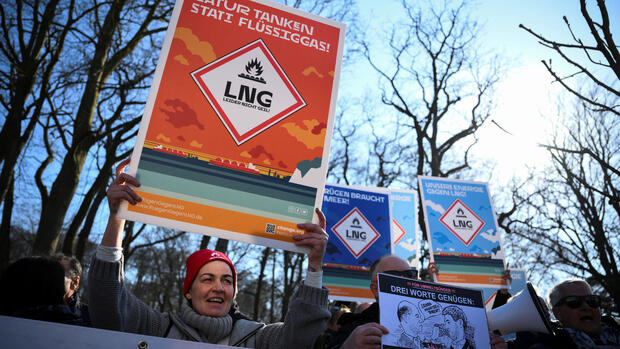Dusseldorf Since the beginning of the year, people have been taking to the streets on the otherwise peaceful Baltic Sea island of Rügen. They are protesting against two planned terminals for liquefied natural gas (LNG) off the coast of the holiday destination – in the middle of a nature reserve. RWE was supposed to build it. Now the Essen-based energy company wants to withdraw from the project surprisingly. Group representatives recently informed the Federal Ministry of Economics of this, reports the news magazine “Spiegel”.
At the request of the Handelsblatt, RWE stated: “We do not want to operate LNG infrastructure permanently and hand these activities over to other players in the foreseeable future.” This was also made clear when the annual figures were announced in March.
RWE CEO Markus Krebber has often emphasized in recent months that the construction and operation of LNG terminals is not a particularly lucrative business for the energy company. One is only involved because the federal government asked for it last year. “Our position is not new and is of course also known to the Federal Ministry of Economics,” the RWE spokeswoman clarifies.
Since mid-December, Germany has been importing its own liquefied natural gas for the first time via the floating LNG terminals “Höegh Esperanza” in Wilhelmshaven and “Neptune” in Lubmin. This is converted back into gas form on site and distributed across the country via pipelines.
Since Russia failed as the largest gas supplier, Germany has had to procure the fossil raw material from alternative sources. In the future, a large part is to come from Qatar, the USA or Australia – by ship and in the form of liquefied natural gas.
Study warns of LNG overcapacity
In addition to Lubmin and Wilhelmshaven, further landing sites are therefore planned. Among other things, the two terminals in front of Rügen. In mid-February, RWE began the preparatory work there on behalf of the government. Always accompanied by loud protests.
Criticism of the additionally planned LNG terminals has been growing louder for months. In the study, the New Climate Institute assumes that Germany will put a total of eleven LNG terminals into operation by the end of 2026. And with that, many more than are actually needed, the authors warn.
The planned terminals would create annual import capacities of around 73 billion cubic meters. For comparison: Last year, Germany received around 50 billion cubic meters of natural gas from Russia.
>> Read also: Germany is still threatened with a gas shortage
In addition, Germany continues to import natural gas via pipelines from Norway and other countries. However, proponents argue that slight overcapacities are always expected in the energy supply in order to ensure the supply if gas supplies fail, for example.
Location not final, costs disputed
A spokeswoman for the Federal Ministry of Economics clarified that a “final political decision on the location” had not yet been made. But it should “fall soon”. This is then also done in close coordination with RWE. Talks about further measures and decisions are ongoing.
>> Read also: How the North Sea is to become the “largest power plant in the world”.
While the Chancellery is pushing for security of supply, apparently not everyone in the Federal Ministry of Economics is convinced of the project. The Ministry published a report on this at the beginning of March. In it, the highest possible scenario is actually chosen when estimating the gas consumption. And if another ten percent consumption is added as a “risk premium”.
Contrary to scientific recommendations, billions of taxpayers’ money would be invested in an oversized LNG infrastructure that is not needed for energy security, environmentalists criticize.
So far, the federal government has earmarked 9.8 billion euros for its plans between 2022 and 2038. But there could be more.
More: There is a risk of overcapacity for LNG – is Germany building too many terminals?
